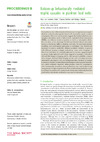Identificador persistente para citar o vincular este elemento:
https://accedacris.ulpgc.es/jspui/handle/10553/75444
| Campo DC | Valor | idioma |
|---|---|---|
| dc.contributor.author | van Someren Gréve, Hans | en_US |
| dc.contributor.author | Kiørboe, Thomas | en_US |
| dc.contributor.author | Almeda García, Rodrigo | en_US |
| dc.date.accessioned | 2020-11-12T10:02:02Z | - |
| dc.date.available | 2020-11-12T10:02:02Z | - |
| dc.date.issued | 2019 | en_US |
| dc.identifier.issn | 0962-8452 | en_US |
| dc.identifier.uri | https://accedacris.ulpgc.es/handle/10553/75444 | - |
| dc.description.abstract | Our traditional view of the interactions between marine organisms is conceptualized as food webs where species interact with one another mainly via direct consumption. However, recent research suggests that understudied non-consumptive interactions, such as behaviourally mediated indirect interactions (BMIIs), can influence marine ecosystems as much as consumptive effects. Here, we show, to our knowledge, the first experimental evidence and quantification of bottom-up BMIIs in plankton food webs. We used observational, modelling and experimental approaches to investigate how behavioural responses to resource availability influence predation mortality on grazers with different foraging strategies (ambushing versus active foraging). A three-level food chain was used: phytoplankton as resource, copepod nauplii as grazers of phytoplankton and a large copepod as a predator. Ambushers showed little change in foraging activity with resource availability, whereas active foragers decreased their foraging activity with increasing resources, which led to a decrease (24–50%) in predation mortality. Therefore, an increase in resources (‘initiator’) causes behavioural changes in active grazers (‘transmitter’), which ultimately negatively affects predator (‘receiver’) consumption rates. Consequently, increase in resource abundance may result in decreasing energy transfer to higher trophic levels. These results indicate that behaviourally mediated interactions drive marine food web dynamics differently from that predicted by only density-mediated or consumptive interactions. | en_US |
| dc.language | eng | en_US |
| dc.relation.ispartof | Proceedings of the Royal Society B: Biological Sciences | en_US |
| dc.source | Proceedings of the Royal Society B: Biological Sciences [ISSN 0962-8452], v. 286, (20181664) | en_US |
| dc.subject | 251001 Oceanografía biológica | en_US |
| dc.subject.other | Behaviourally mediated indirect interactions | en_US |
| dc.subject.other | Plankton food webs | en_US |
| dc.subject.other | Zooplankton behavioural plasticity | en_US |
| dc.subject.other | Pptimal foraging | en_US |
| dc.subject.other | Predation risk | en_US |
| dc.title | Bottom-up behaviourally mediated trophic cascades in plankton food webs | en_US |
| dc.type | info:eu-repo/semantics/article | - |
| dc.type | Article | - |
| dc.identifier.doi | 10.1098/rspb.2018.1664 | en_US |
| dc.identifier.issue | 1896 | - |
| dc.relation.volume | 286 | en_US |
| dc.investigacion | Ciencias | en_US |
| dc.type2 | Artículo | - |
| dc.description.numberofpages | 10 | en_US |
| dc.date.coverdate | 24 april 2019 | en_US |
| dc.identifier.ulpgc | No | en_US |
| dc.contributor.buulpgc | BU-BAS | en_US |
| dc.description.sjr | 2,626 | |
| dc.description.jcr | 4,637 | |
| dc.description.sjrq | Q1 | |
| dc.description.jcrq | Q1 | |
| dc.description.scie | SCIE | |
| item.fulltext | Con texto completo | - |
| item.grantfulltext | open | - |
| crisitem.author.dept | GIR ECOAQUA: Ecofisiología de Organismos Marinos | - |
| crisitem.author.dept | IU de Investigación en Acuicultura Sostenible y Ecosistemas Marinos (IU-Ecoaqua) | - |
| crisitem.author.dept | Departamento de Biología | - |
| crisitem.author.orcid | 0000-0002-0090-112X | - |
| crisitem.author.parentorg | IU de Investigación en Acuicultura Sostenible y Ecosistemas Marinos (IU-Ecoaqua) | - |
| crisitem.author.fullName | Almeda García, Rodrigo | - |
| Colección: | Artículos | |
Citas de WEB OF SCIENCETM
Citations
15
actualizado el 12-ene-2026
Visitas
265
actualizado el 15-ene-2026
Descargas
117
actualizado el 15-ene-2026
Google ScholarTM
Verifica
Altmetric
Comparte
Exporta metadatos
Los elementos en ULPGC accedaCRIS están protegidos por derechos de autor con todos los derechos reservados, a menos que se indique lo contrario.
